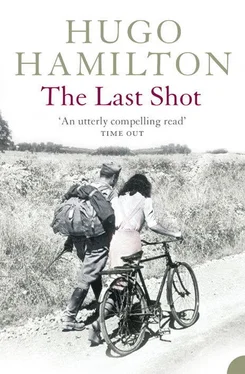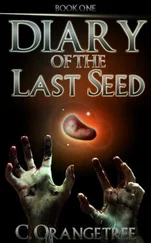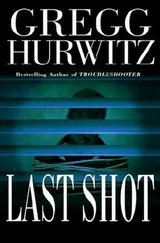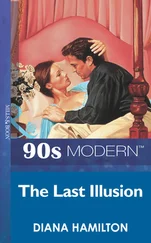‘But how are you going to do it?’ I wanted to know.
‘It is very simple. It’s done on the drip, you know, intravenously through the arm. First sugar, then pain-killers, morphine, then potassium. It could be done with morphine alone at this stage. But that is the best way. Basically, Alex will just fall asleep.’
Jürgen said it all without enthusiasm, as though he couldn’t stomach the idea himself. He hated the efficiency of his plan, but saw no way out.
‘Of course, the whole thing is very risky for me. If this is discovered, my life is finished as a gynaecologist. I have thought about all of this. If somebody found out, or exposed me to the public, I would become a household name, for the wrong thing. The press would seize on something like this…
‘But I don’t care. I want to do this for Alex. There is no way out.’
There was no way that anything I would say was going to stop him. I trusted him. I told him it wasn’t my decision, but that I was fully behind him. I didn’t want him to risk his profession. I told him I was on his side.
‘I don’t know when exactly it will have to be done. I will phone you. Or Anke will phone you.’
We walked back to the station, up to platform 13 for the Intercity to Münster. Jürgen said that after all this was over I would have to come and visit them again. He would definitely take the time off to teach me hang-gliding.
Three weeks later, I was on my way to Nuremberg again to meet the real Franz Kern. The woman, Frau Jazinski, who had answered my ad in the Frankfurter Allgemeine, tried at first to establish my reasons for wanting to meet him. She wouldn’t even say whether he was alive or not. She asked me to give my reasons in writing in the most specific terms. I remained evasive in my next letter, stressing that I had nothing to do with researching war crimes or anything. All I wanted was to pass on a message from somebody, a colleague who had been in Laun with Franz Kern.
Eventually, Frau Jazinski gave me a cautious invitation. I phoned her and set up a date to travel to Nuremberg. She still gave little information about Kern, and I had the feeling that she was acting as a go-between, that it was really Franz Kern who had seen the ad and asked her to vet me on his behalf.
I stayed at the Pension Sonne again.
‘Another market survey?’ the owner Frau Schellinger asked with a broad smile. She told me straight out that she liked it when her old guests came back again.
The following afternoon I went to visit Frau Jazinski at the address she had given me, a large house close to the city centre. She answered the door herself and searched me with her eyes. I could see she had her suspicions about me. She turned out to be Franz Kern’s daughter, his only child. She offered me some coffee and told me that her father had just recently come out of hospital and that he was still unwell. With that, she asked me to give the message to her so that she could pass it on to him.
I told her it was personal. I could only pass it on myself. All this was beginning to sound far too clandestine and intriguing. I wished she weren’t so suspicious and that everything would be more simple. I assured her again that I had nothing to do with war-crimes detection. I had no interest in the holocaust. I would leave that to somebody with a clean slate.
By the time she agreed to drive me over to her father’s apartment I realized that she had been kept completely in the dark. She wanted to find out something for herself before I met Kern. He had told her nothing about Laun. And nothing about the journey home either.
On the way over in the car, Frau Jazinski became more friendly. She began to tell me about their business. They owned a big hi-fi shop in the city centre. She insisted on driving down the street and asking me to look at the shop.
‘My father started this business on his own after the war. It wasn’t easy. Things were very hard for him and my mother. They had to save every Pfennig.’
How often had I heard that story? She went on praising her father for building up the shop. In the past ten years, with her husband taking over as managing director, the turnover had multiplied a hundredfold, she said proudly. I told her she was in the right business.
She still didn’t know exactly why I had come to visit her father. Franz Kern had consented to see me without telling her why. She was sure it would all come out sooner or later.
I asked her about her mother. She was dead. Almost ten years ago.
Franz Kern lived in the top half of a house. The living-room had a spacious balcony looking out over a large garden. The walls were lined with books. The place was well looked-after.
I was going to be surprised by this meeting. I had no idea what he looked like, no idea what to expect.
Franz Kern was a tall man; even in his late seventies, he was as tall as I was. He stood up from his chair by the window to greet me, grimacing a little with stiffness or pain. I begged him not to get up on my account. We shook hands and he asked me to sit down, pointing with the palm of his hand towards an armchair. He was a very calm man, who moved around the room slowly on his stick. He was able to close the window on his own, until his daughter came running and told him to leave it to her. Maria, as he called her, went out to make coffee in the kitchen.
Kern looked at me for a long time. He had a likeable smile. You could have nothing against him. He just kept staring at me until I looked away. Old people are allowed to do that.
‘You look like her,’ he said quietly.
I didn’t reply.
‘Bertha…Where did she get to?’ he asked, almost in a dreamy way, still looking at me, but somehow as though he was actually talking to her. And somehow, he wasn’t expecting me to answer. He put his finger up to his mouth to say: Shhhh.
He didn’t want his daughter to know. We sat like mute men looking at each other while Maria brought in the coffee, filled the cups and apportioned the ostentatious strawberry cake she had brought. We sat there without ever mentioning anything. Kern was saying nothing while Maria was there. So we talked about the united Germany – what else? It was like talking about the weather. Maria said how exciting it was for Germany. Kern sat back.
‘At long last,’ he said. ‘At last, we can breathe like Germans again. It’s what we were all running from at the end of the war. This Soviet monster…’
He seemed angry.
‘We saw the tanks, the Red Army tanks behind us as we fled…’
He wasn’t boastful; I’ve met survivors with varying emotions, from anger to indifference. I’ve met survivors who talked about their luck, like a lottery prize. And survivors who claimed credit for their own lives, people who reckoned they were indestructible, as though they had an invincible charm which saved their own necks. They made themselves look like those trick birthday candles which flare up every time you blow them out. It was as if nothing in the perverse logic of the Reich had anything to do with it; their being alive. There were others I met who had put their trust in God, and thanked God with every mouthful of cake, with every word, for their existence.
Franz Kern was none of these. He acknowledged that he was just lucky, no more. Or can you say that survivors are lucky, he asked. Can you be lucky at the expense of somebody else? In any case, Kern didn’t take his life for granted.
He turned to Maria, his daughter, and asked her if she had something to do in the area. If she wished, she could leave us to talk for a while. She was a little put out. But she left and said she would be back in an hour. I told her I could make my own way back if she liked. But she insisted on driving me back. She was afraid her father might never tell her anything and was determined to squeeze some information out of me on the way home.
Читать дальше
Конец ознакомительного отрывка
Купить книгу












